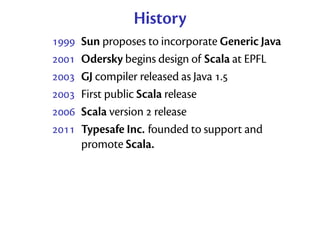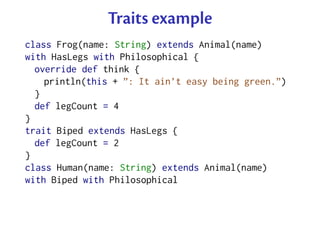The Scala Programming Language
- 1. e Scala Programming Language Christopher League LIU Brooklyn February
- 2. Prehistory Martin Odersky receives Ph.D. from Niklaus Wirth at ETH Zürich. Odersky and Phil Wadler team up to design Pizza, a functional language that targets Java Virtual Machine. Propose Generic Java, with Gilad Bracha and David Stoutamire
- 3. History Sun proposes to incorporate Generic Java Odersky begins design of Scala at EPFL GJ compiler released as Java . First public Scala release Scala version release Typesafe Inc. founded to support and promote Scala.
- 4. Who uses Scala? AppJet Office Depot Ebay SAIC Foursquare Siemens GridGain Sony Guardian Sygneca LinkedIn atcham Managed Gaming Twitter Nature WattzOn Novell Xebia Novus Partners Xerox OPower ...
- 6. One-slide summary: Scala is... Scalable Object-oriented Functional Compatible Concise High-level Statically typed Interactive (REPL)
- 7. Scala is... concise Typical Java class definition class MyClass { private int index; private String name; public MyClass(int index, String name) { this.index = index; this.name = name; } } Equivalent Scala class definition class MyClass(index: Int, name: String)
- 8. Scala is... high-level Java: Does a string have an uppercase character? boolean nameHasUpperCase = false; for (int i = 0; i < name.length(); ++i) { if (Character.isUpperCase(name.charAt(i))) { nameHasUpperCase = true; break; } } Equivalent Scala: val nameHasUpperCase = name.exists(_.isUpper)
- 10. Agenda . Introduction to Scala . Object-oriented programming . Objects, classes, and traits . Collections hierarchy . Functional programming . Immutability . Higher-order functions . Algebraic data types . Concurrency . Summary and resources
- 11. Objects and classes In Java and C++, classes... . are a template for creating new objects dynamically . define the methods and fields of those objects . provide a namespace for static methods and fields, unconnected to a particular object In Scala, Classes are responsible only for and . For , we define a singleton object as a container for static members.
- 12. Example class ChecksumAccumulator { private var sum = 0 def add(b: Byte) { sum += b } def checksum(): Int = ˜(sum & 0xFF) + 1 } object ChecksumAccumulator { private val cache = Map[String, Int]() def calculate(s: String): Int = if (cache.contains(s)) cache(s) else { val acc = new ChecksumAccumulator for (c <- s) acc.add(c.toByte) val cs = acc.checksum() cache += (s -> cs) cs }
- 13. Other notable features Identifiers declared as either val (immutable value) or var (mutable variable) Methods introduced by def Array/map/function syntax are unified: cache(s) Instantiation of generic types: Map[String, Int] if/else returns a value Last expression of a block is returned, as long as method body preceded by ‘=’ Very general loop syntax: for(x <- xs) . . . (More on that later...)
- 14. Immutable object example class Rational(n: Int, d: Int) { // main constructor require(d != 0) // or else IllegalArgumentException private val g = gcd(n.abs, d.abs) val numer = n / g val denom = d / g def this(n: Int) = this(n, 1) // auxiliary c’tor def add(that: Rational): Rational = new Rational (numer * that.denom + that.numer * denom, denom * that.denom) override def toString = numer + ”/” + denom private def gcd(a: Int, b: Int): Int = if (b == 0) a else gcd(b, a % b) }
- 15. Traits A trait encapsulates method and field definitions, which can then be reused by mixing them into classes. A class can mix in any number of traits, defining stackable modifications.
- 16. Traits example class Animal(val name: String) { override def toString = name } trait Philosophical { def think { println(this + ”: ” + ”I consume memory, therefore I am.”) } } class Squid extends Animal(”Søren”) with Philosophical trait HasLegs { def legCount: Int def jump { println(this + ”: How high?”) } }
- 17. Traits example class Frog(name: String) extends Animal(name) with HasLegs with Philosophical { override def think { println(this + ”: It ain’t easy being green.”) } def legCount = 4 } trait Biped extends HasLegs { def legCount = 2 } class Human(name: String) extends Animal(name) with Biped with Philosophical
- 18. Traits example scala> val s = new Squid s: Squid = Søren scala> val f = new Frog(”Kermit”) f: Frog = Kermit scala> val h = new Human(”Alice”) h: Human = Alice scala> s.think Søren: I consume memory, therefore I am. scala> f.think Kermit: It aint easy being green. scala> h.legCount res3: Int = 2 scala> f.legCount res4: Int = 4 scala> s.legCount error: value legCount is not a member of Squid
- 20. Live-coding in REPL with collections
- 21. Agenda . Introduction to Scala . Object-oriented programming . Objects, classes, and traits . Collections hierarchy . Functional programming . Immutability . Higher-order functions . Algebraic data types . Concurrency . Summary and resources
- 22. Immutability Identifiers declared as either val (immutable value) or var (mutable variable) scala.collection.immutable vs. scala.collection.mutable scala> import scala.collection.mutable.{Set => MSet} scala> import scala.collection.immutable.Set scala> val s1 = MSet(2,6,7,9) scala> val s2 = Set(3,4,7,8) scala> s1 += 5 res9: s1.type = Set(9, 2, 6, 7, 5) scala> s1 contains 5 res10: Boolean = true scala> s2 += 5 error: reassignment to val
- 23. Why prefer immutability? Referential transparency — easier for compilers and people to reason about code if f(x) always equals f(x) Concurrency — multiple threads updating a single variable or data structure can corrupt it. Fewer updates make it easier to prevent corruption.
- 24. Higher-order functions Function values can be passed to other functions, stored in data structures. Syntax of function value: { (x: Int) => x * x } { x => x * 2 } // if type can be inferred { _ * 2 } // if parameter used just once Example from before: name.exists( .isUpper) Define your own control structures! def unless(cond: Boolean)(block: =>Unit) = if(!cond) block unless(3 < 1) { println(”Huh.”) }
- 25. e flexible ‘for’ comprehension scala> for(i <- 0 to 3; j <- i+1 to 4) yield (i,j) scala.collection.immutable.IndexedSeq[(Int, Int)] = Vector((0,1), (0,2), (0,3), (0,4), (1,2), (1,3), (1,4), (2,3), (2,4), (3,4)) ‘for’ is based entirely on higher-order functions: (0 to 3).flatMap(i => (i+1 to 4).map(j => (i,j))) // where: flatMap[B](A => TraversableOnce[B]): Seq[B] map[B](A => B): Seq[B]
- 26. Algebraic data types Based on case classes in Scala: abstract class Tree[A] case class Leaf[A](value: A) extends Tree[A] case class Branch[A]( left: Tree[A], right: Tree[A] ) extends Tree[A] You can construct objects without new All parameters become immutable fields Compiler generates sensible toString, equals, and copy methods. Live-coding binary tree operations
- 27. Agenda . Introduction to Scala . Object-oriented programming . Objects, classes, and traits . Collections hierarchy . Functional programming . Immutability . Higher-order functions . Algebraic data types . Concurrency . Summary and resources
- 28. Scala actor asynchronicity scala> import scala.actors.Actor._ scala> actor{println(”TICK”)}; println(”TOCK”) TOCK TICK scala> actor{println(”TICK”)}; println(”TOCK”) TICK TOCK
- 30. Scala actors Actors are objects that send/receive messages. a ! m sends message m to actor a, and returns immediately (fire and forget). System serializes message receives within actor. react does not block thread, but also does not return. Can arrange computations to follow react using loop, andThen.
- 31. Scala actor messaging import scala.actors.Actor._ case object Incr case object Get val counter = actor { var n = 0 loop { // repeatedly wait for a message react { // (but don’t block thread) case Incr => n += 1; println(n) case Get => sender ! n } } } counter ! Incr // fire and forget; eventually counter ! Incr // prints ’1’ then ’2’
- 32. Future power people scala> counter ! Incr scala> counter ! Incr 3 4 scala> val f = counter !! Get f: z.Future[Any] = <function0> scala> f.foreach { case x: Int => println(”Square is ” + x*x) } Square is 16
- 33. ‘For’ the future Because Future implements standard collection methods like flatMap, you can sequence asynchronous computations with ‘for’ syntax: for(r1 <- act1 !! SomeOperation(x1,x2); r2 <- act2 !! AnotherOperation(r1,y1,y2)) { storeResult(r2) }
- 34. Resources scala-lang.org typesafe.com Free* e-book: slidesha.re/BnNJu ny-scala meetup











![Example
class ChecksumAccumulator {
private var sum = 0
def add(b: Byte) { sum += b }
def checksum(): Int = ˜(sum & 0xFF) + 1
}
object ChecksumAccumulator {
private val cache = Map[String, Int]()
def calculate(s: String): Int =
if (cache.contains(s)) cache(s)
else {
val acc = new ChecksumAccumulator
for (c <- s) acc.add(c.toByte)
val cs = acc.checksum()
cache += (s -> cs)
cs
}](https://image.slidesharecdn.com/slides-130222132145-phpapp02/85/The-Scala-Programming-Language-12-320.jpg)
![Other notable features
Identifiers declared as either val (immutable value)
or var (mutable variable)
Methods introduced by def
Array/map/function syntax are unified: cache(s)
Instantiation of generic types: Map[String, Int]
if/else returns a value
Last expression of a block is returned, as long as
method body preceded by ‘=’
Very general loop syntax: for(x <- xs) . . .
(More on that later...)](https://image.slidesharecdn.com/slides-130222132145-phpapp02/85/The-Scala-Programming-Language-13-320.jpg)











![e flexible ‘for’ comprehension
scala> for(i <- 0 to 3; j <- i+1 to 4) yield (i,j)
scala.collection.immutable.IndexedSeq[(Int, Int)] =
Vector((0,1), (0,2), (0,3), (0,4),
(1,2), (1,3), (1,4),
(2,3), (2,4),
(3,4))
‘for’ is based entirely on higher-order functions:
(0 to 3).flatMap(i =>
(i+1 to 4).map(j =>
(i,j)))
// where:
flatMap[B](A => TraversableOnce[B]): Seq[B]
map[B](A => B): Seq[B]](https://image.slidesharecdn.com/slides-130222132145-phpapp02/85/The-Scala-Programming-Language-25-320.jpg)
![Algebraic data types
Based on case classes in Scala:
abstract class Tree[A]
case class Leaf[A](value: A) extends Tree[A]
case class Branch[A](
left: Tree[A], right: Tree[A]
) extends Tree[A]
You can construct objects without new
All parameters become immutable fields
Compiler generates sensible toString, equals,
and copy methods.
Live-coding binary tree operations](https://image.slidesharecdn.com/slides-130222132145-phpapp02/85/The-Scala-Programming-Language-26-320.jpg)





![Future power people
scala> counter ! Incr
scala> counter ! Incr
3
4
scala> val f = counter !! Get
f: z.Future[Any] = <function0>
scala> f.foreach { case x: Int =>
println(”Square is ” + x*x) }
Square is 16](https://image.slidesharecdn.com/slides-130222132145-phpapp02/85/The-Scala-Programming-Language-32-320.jpg)
















![E34 : [JPOUG Presents] Oracle Database の隠されている様々な謎を解くセッション「なーんでだ?」再び @ db tec...](https://cdn.slidesharecdn.com/ss_thumbnails/dbtechshowcase2015-150612232815-lva1-app6892-thumbnail.jpg?width=560&fit=bounds)















































